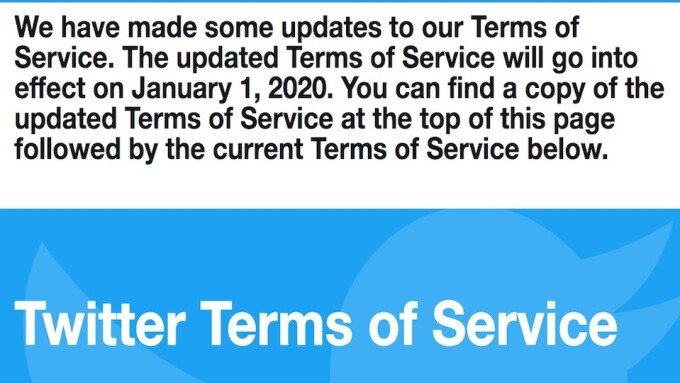SAN FRANCISCO — Twitter, the one major social media platform that tolerates open sexual expression, and users who are sex workers, has unveiled a new set of Terms of Service effective January 1, 2020.
Over the past few days Twitter users have been prompted to press “agree” to the new Terms of Service, though it is safe to assume that most users have not looked in-depth into the changes from the current Terms of Service, which went into effect in March 2018.
The changes to the Twitter Terms of Service, however, might affect content uploaded by sex workers and others in the adult community.
Twitter Adds Own Definition of Shadowbanning To TOS
The changes amount to about 10 lines scattered through the 12-page document.
While some of them are mere clarifications from the previous TOS, and one paragraph concerns the Twitter Vulnerability Reporting Program, there’s one change in the terms of service that should concern those interested in the company’s control over the content that one’s followers see.
In a nutshell: Twitter has explicitly reserved the right to shadowban, under the legalese of “limit distribution or visibility of any Content on the service.”
This is the paragraph from the March 2018 terms of service, which apply until December 31, 2019:
"Our Services evolve constantly. As such, the Services may change from time to time, at our discretion. We may stop (permanently or temporarily) providing the Services or any features within the Services to you or to users generally. We also retain the right to create limits on use and storage at our sole discretion at any time. We may also remove or refuse to distribute any Content on the Services, suspend or terminate users, and reclaim usernames without liability to you."
And this is the revised passage, effective January 1, 2020 (italics added by XBIZ):
"Our Services evolve constantly. As such, the Services may change from time to time, at our discretion. We may stop (permanently or temporarily) providing the Services or any features within the Services to you or to users generally. We also retain the right to create limits on use and storage at our sole discretion at any time. We may also remove or refuse to distribute any Content on the Services, limit distribution or visibility of any Content on the service, suspend or terminate users, and reclaim usernames without liability to you."
The change only applies to users who live outside the European Union or European Economic Area. This includes all users in the United States.
Twitter has two sets of Terms of Service, one of which only applies to users within the European Union or European Economic Area. The paragraph in question in the European TOS, effective January 2020, is identical to the March 2018 TOS, without the 10 crucial words by which the company reserves the right to shadowban content (“limit distribution or visibility of any Content on the service”) at their sole discretion.
Many members of the adult industry, and also many friends and fans, have noticed that standard Twitter features — especially predictive text when @ing, tagging or attempting to message — have been disabled by the company for their Twitter accounts.
XBIZ has repeatedly attempted to contact Twitter over the last few months about what appears to be discriminatory practices against sexual expression, and sex workers, and about their slow response to the “Omid” harassment campaign coordinated between the Instagram and Twitter platforms by malicious actors, but we have received no response.
For both versions of the Twitter Terms of Service (January 2020, followed by March 2018), click here.








